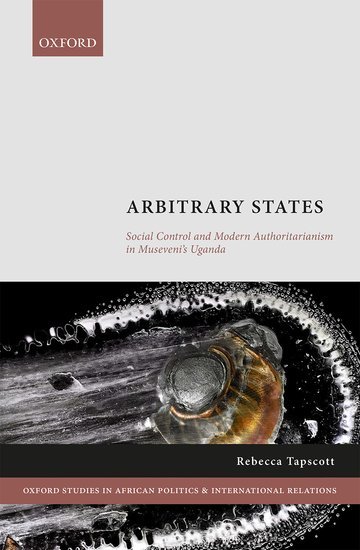Arbitrary States: Social Control and Modern Authoritarianism in Museveni's Uganda, Oxford University Press, 2021
Arbitrary States is a study of the Ugandan state from below, focusing on local violent actors and their relationship to state authorities to explain how the state projects its authority into everyday life. It draws on extensive fieldwork conducted in Uganda, and interviews with vigilantes, community policing outfits, local authorities, and police. The book was a finalist for the African Studies Association’s Bethwell A. Ogot Book Prize. It has been reviewed in African Affairs, Perspectives on Politics, Civil Wars, Journal of Development Studies, and Foreign Affairs, among other outlets.
The book is open access, and can be freely downloaded on the publisher's website, here.
I have explored the broader implications of my book with the Albert Hirschman Centre on Democracy via interview (New Perspectives on Modern Authoritarianism) and podcast (Fear and Empathy in Fieldwork) as well as producing alternative media in the form of a comic strip, in collaboration with Victor Ndula (Vigilantes: Security or Insecurity?).

Book Reviews:
"[A] great example of a book in which the reader is treated to a convincing case study that is connected - in a surefooted way - to wider themes... It is the ability to see the systemic nature of apparently chaotic forms of governance that makes this an important book...There is no doubting that scholars, practitioners and policymakers will be using this book in attempting to understand forms of authoritarianism that have a tensile strength that they draw from subtle flexibilities." ~ Roger Mac Ginty, Civil Wars
"Arbitrary States is a deeply fascinating study that advances an original and important argument about present-day Uganda. Tapscott convincingly shows how the Museveni regime uses unpredictability as a mode of governance, leading citizens to self-police in the face of uncertainty and institutionalized arbitrariness. Fascinating in its empirical richness and impressive in its analytical reach, Arbitrary States is a must read for anyone interested in contemporary authoritarianism in Africa and beyond." ~ Rita Abrahamsen, Professor in the Graduate School of Public and International Affairs and Director of the Centre for International Policy Studies, University of Ottawa
“In [Tapscott’s] careful analysis of the country’s security sector … she notes that the regime has put in place a system of “institutionalized arbitrariness,” in which the inconsistent interventions of the state encourage citizens to seek out their own solutions to insecurity—only for the state to then intervene in a powerful but bludgeoning manner that often punishes the citizens”. ~ Nicolas van de Walle, Foreign Affairs.
"Tapscott's book is ground-breaking and compelling. It aptly describes the contours of state power in Uganda under Museveni while also providing a fine-grained theoretical framework with implications beyond Uganda... Ugandan politics specialists, as well as scholars of comparative politics, will find this book very useful in making sense of one of the most important puzzles in our field-how to manage centralised use of violence." ~ Moses Khisa, Journal of Development Studies
In Progress
The Global Politics of Research Ethics in the Social Sciences: From an Ethics of Research Practice to an Ethics of Research Purpose, under contract with Oxford University Press.
In the social sciences, research ethics is widely understood as a question of good research process and practice. It takes a set of ethical principles—typically beneficence, respect for persons, and justice—and applies them to specific research projects and their implementation. “Ethical” research minimizes risks; it ensures informed consent; and it guarantees that research participants share in its benefits.
But this approach has important limitations, especially for the social sciences. The book locates these limitations in the origins of contemporary approaches to research ethics—which emerged mainly to guide biomedical research and then were extended to the social sciences. These biomedical origins carry with them assumptions about what academic research is, and how it contributes to society, seeing research as a practice that can be separate and even autonomous from messy social and political dynamics. These assumptions are at odds with core insights of the social sciences. As a result, when used to regulate the social sciences, ethical review structures can have unanticipated outcomes.
The book studies ethical review in diverse corners of the world to show how our systems of ethical review are historically situated and emplaced. In doing so, it highlights that ethical review is best understood in relation to the social function of research; and diverse political economies of knowledge production. It takes a critical and comparative approach combining diverse desk-based methods with country case studies and key informant interviews. The book will be of broad interest to students, scholars, and the public concerned with the ethics of social science research.